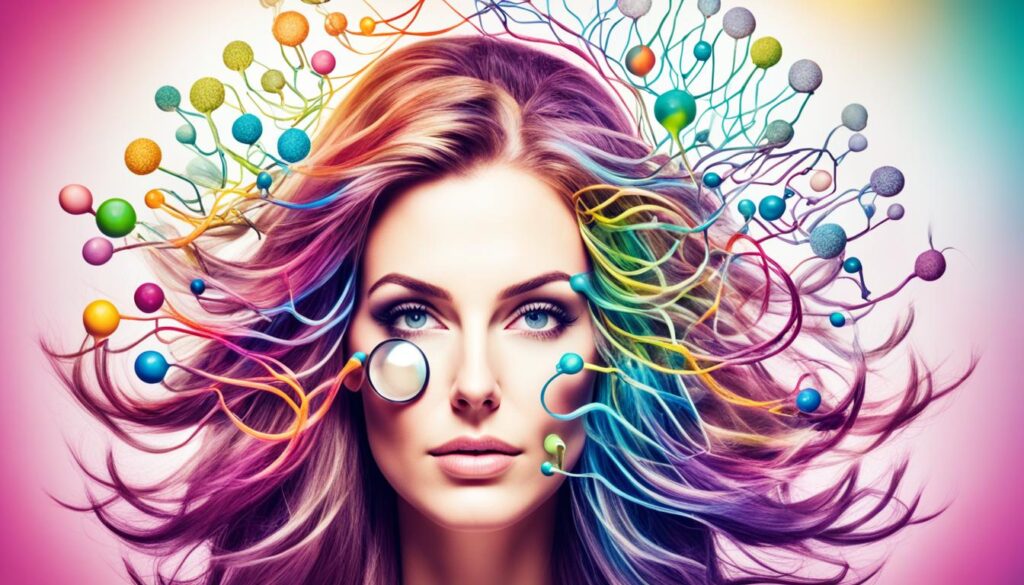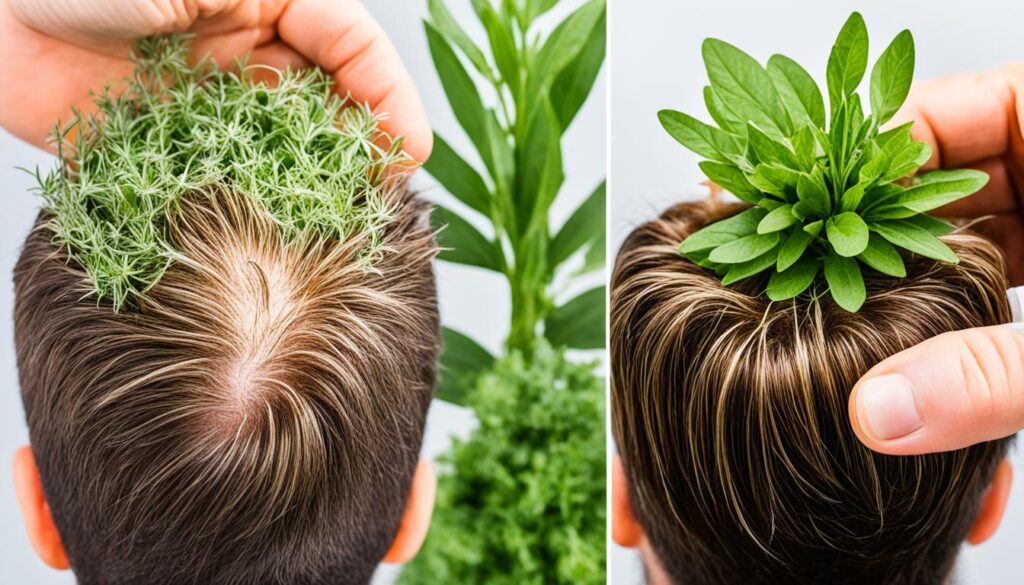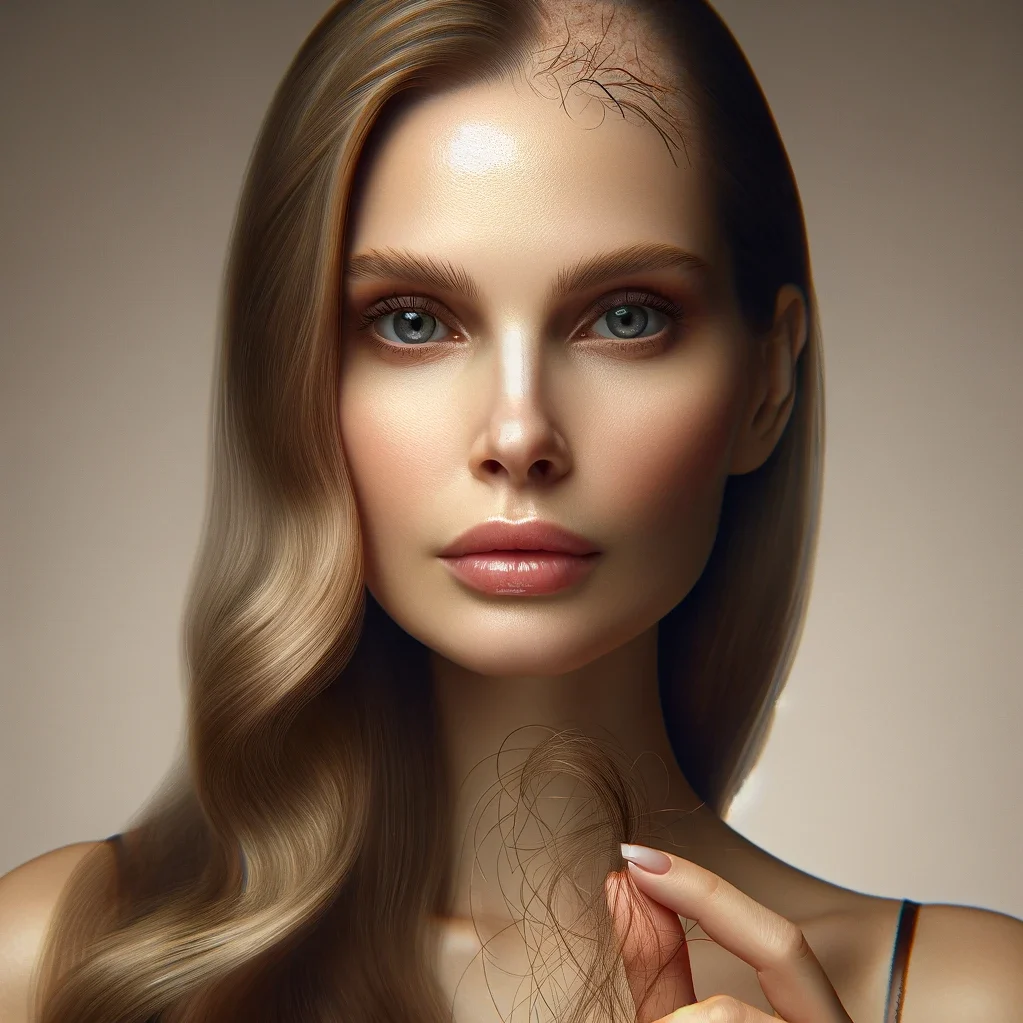Did you know that the average human scalp contains about 100,000 hair follicles? Each follicle has the potential to grow a strand of hair, making hair growth a remarkable biological process. But what exactly is responsible for this fascinating phenomenon? Let’s explore the factors that influence hair growth and discover how hormones play a crucial role in determining the growth and health of our hair.
Key Takeaways:
- Hair growth is influenced by various factors.
- Hormones have a significant impact on the hair growth cycle.
- Understanding the role of hormones is key to understanding hair growth.
- Hair growth can be affected by hormone imbalances and conditions such as PCOS and menopause.
- Treatments like hormone replacement therapy and natural remedies can promote hair growth.
The Hair Growth Cycle Explained
The hair growth cycle consists of three phases: anagen, catagen, and telogen. Understanding these phases is essential to comprehend the influence of hormones on hair growth.
The Anagen Phase
The anagen phase is the active growth phase of the hair follicles. During this phase, the hair follicles divide and promote hair growth. It is the longest phase of the hair growth cycle, lasting up to six years in some individuals. The duration of the anagen phase determines the maximum length that a hair strand can achieve.
The Catagen Phase
The catagen phase is a transitional phase in which the hair follicles prepare for the next phase. During this phase, no hair growth occurs. The duration of the catagen phase is relatively short, lasting only a few weeks.
The Telogen Phase
The telogen phase is a resting phase that follows the catagen phase. In this phase, the hair follicles shed old hair and make way for new hair growth. The duration of the telogen phase can vary between individuals, typically lasting several months. It is during this phase that hair loss occurs naturally.
“Understanding the hair growth cycle is important in understanding how hormones influence hair growth.”
By comprehending the hair growth cycle, individuals can gain insight into the impact of hormones on hair growth. This understanding can serve as a foundation for exploring and addressing hair growth concerns.
The Impact of Hormones on Hair Growth
Hormones play a crucial role in hair growth. The levels of hormones in our body can determine whether we experience excessive hair growth or hair thinning and loss. Let’s take a closer look at how specific hormones affect our hair.
DHEA and Testosterone
DHEA (Dehydroepiandrosterone) and testosterone are hormones that are closely linked to hair growth. When the levels of these hormones are elevated, especially in women with conditions like polycystic ovary syndrome (PCOS), it can lead to excessive hair growth, often seen on the body and face. On the other hand, a drop in hormone levels can result in hair thinning and loss.
Dihydrotestosterone (DHT)
Dihydrotestosterone (DHT) is a hormone that plays a significant role in male-pattern baldness. DHT is derived from testosterone and is known to bind to hair follicles, causing them to shrink over time. This leads to a shorter hair growth cycle and, eventually, thinner and shorter hair strands. Understanding the impact of DHT is crucial in addressing male-pattern baldness and exploring potential treatment options.
Hormone Imbalances
Hormone imbalances can have a profound effect on hair growth. Conditions like PCOS or menopause, where hormone levels fluctuate, can contribute to hair thinning and loss. Balancing hormone levels through proper medical care is essential for maintaining healthy hair.
To better understand how hormones impact hair growth, let’s take a look at a summarized table:
| Hormone | Effect on Hair Growth |
|---|---|
| DHEA and Testosterone | When levels are high, can cause excessive hair growth; when levels drop, may lead to hair thinning and loss |
| Dihydrotestosterone (DHT) | Primarily responsible for male-pattern baldness; binds to hair follicles, causing them to shrink over time |
| Hormone Imbalances | Conditions like PCOS or menopause can contribute to hair thinning and loss due to hormone fluctuations |
Understanding the role hormones play in hair growth is crucial in addressing hair thinning and loss. Identifying hormone imbalances and exploring appropriate treatment options, such as hormone replacement therapy or other medical interventions, can help restore hair health and promote regrowth.

When it comes to maintaining healthy hair, it’s essential to consider the impact of hormones. By understanding how hormones like DHEA, testosterone, and DHT influence hair growth, we can take proactive steps to manage hormone imbalances and promote optimal hair health.
Hair Growth Treatments and Solutions
When it comes to promoting hair growth, there are various treatments and solutions available. Whether you’re experiencing hormone-related hair loss or looking for natural remedies, we’ve got you covered. Let’s explore some options:
Hormone Replacement Therapy
If your hair loss is caused by hormonal imbalances, hormone replacement therapy (HRT) may be recommended. HRT involves receiving synthetic hormones that help balance your hormone levels and promote healthy hair growth.
DHT Blockers
Dihydrotestosterone (DHT) is a hormone that can contribute to male-pattern baldness when it binds to hair follicles. DHT blockers are medications or supplements that work by inhibiting the production of DHT, helping to prevent further hair loss.
Natural Hair Growth Remedies
If you prefer a more natural approach to hair growth, there are several remedies and products available. These include vitamins, minerals, and herbal supplements that nourish the hair follicles and promote healthy growth. Some popular natural remedies include biotin, saw palmetto, and pumpkin seed oil.

Remember, it’s important to consult with a healthcare professional or a trichologist to determine the best treatment or solution for your specific hair growth concerns. They can provide personalized recommendations based on your individual needs and medical history. With the right approach, you can nourish your hair and achieve healthy, vibrant growth.
Lifestyle Factors and Hair Growth
Lifestyle factors play a crucial role in hair growth and health. Poor diet, excessive stress, and hormone imbalances can all contribute to hair thinning and loss. It is essential to prioritize a healthy lifestyle to support optimal hair growth. Let’s explore some key lifestyle factors and their impact on hair health:
Diet and Hair Growth
A well-balanced diet rich in essential nutrients is vital for promoting healthy hair growth. Foods that are high in protein, such as lean meats, fish, and legumes, provide the building blocks for strong hair. Incorporating healthy fats found in avocados, nuts, and olive oil can improve the shine and texture of the hair. Additionally, consuming a variety of fruits and vegetables packed with vitamins and minerals nourishes the scalp and supports hair growth.
The Effects of Stress on Hair
Stress, whether caused by work, relationships, or other factors, can have a detrimental impact on hair health. High levels of stress can disrupt the hair growth cycle, leading to increased hair shedding and slower hair regrowth. Engaging in stress-reducing activities, such as yoga, meditation, or engaging hobbies, can help manage stress levels and promote a healthier hair growth environment.
“Stress is a silent culprit behind hair loss. Taking steps to reduce stress levels not only benefits your overall well-being but also supports healthy hair growth.”
Hormone Imbalances and Hair Thinning
Hormonal imbalances can contribute to hair thinning and loss in both men and women. Conditions such as polycystic ovary syndrome (PCOS) or menopause can disrupt the normal hormone levels and negatively impact hair growth. Seeking proper medical care and addressing hormone imbalances can help restore the balance and promote healthier hair.
To achieve optimal hair growth, it is important to maintain a healthy lifestyle that includes a nutritious diet, stress management, and addressing any hormone imbalances. By taking care of your body and prioritizing these lifestyle factors, you can support healthy hair growth and enhance your overall well-being.
The Role of Platelet-Rich Plasma (PRP) and Exosomes in Hair Restoration
Platelet-Rich Plasma (PRP) and exosomes are two revolutionary treatments that have gained popularity in the field of hair restoration. These cutting-edge therapies offer promising results in promoting hair growth and restoring hair density. Let’s take a closer look at how PRP and exosomes work to rejuvenate the scalp and combat hair loss.
Platelet-Rich Plasma (PRP) for Hair Restoration:
PRP is a procedure that utilizes the patient’s own blood to stimulate hair growth. During the treatment, a small amount of blood is drawn and then processed to separate the platelets and plasma from other components. The resulting PRP solution, enriched with growth factors and healing properties, is then injected directly into the scalp. This helps to nourish the hair follicles, promote circulation, and stimulate new hair growth.
Exosomes for Hair Restoration:
Exosomes, derived from stem cells, are small extracellular vesicles that play a crucial role in cell-to-cell communication. They are packed with growth factors, cytokines, and other signaling molecules that can contribute to tissue repair and regeneration. When exosomes are applied to the scalp, they help to rejuvenate the hair follicles, promote hair growth, and improve hair density.
Both PRP and exosomes offer distinct benefits for hair restoration:
- PRP is readily available, safe, and minimally invasive. It harnesses the potential of the patient’s own blood to promote natural hair growth.
- Exosomes, with their potent regenerative properties, provide a powerful boost to the hair follicles and can enhance hair growth.
Furthermore, PRP and exosomes can be used as standalone treatments or in conjunction with other hair restoration techniques, such as hair transplants. They can complement and optimize the results of surgical interventions by improving the health of the existing hair follicles and promoting the growth of transplanted hair.
To illustrate the benefits of PRP and exosomes in hair restoration, here is a comparative overview:
| Platelet-Rich Plasma (PRP) | Exosomes |
|---|---|
| Utilizes the patient’s own blood | Derived from stem cells |
| Rich in growth factors and healing properties | Loaded with growth factors, cytokines, and signaling molecules |
| Stimulates hair growth and improves hair density | Promotes tissue repair and regeneration |
| Can be used as a standalone treatment | Enhances the effectiveness of other treatments |
The Promise of PRP and Exosomes
Clinical studies have shown promising results with both PRP and exosomes in hair restoration. Patients have experienced noticeable improvements in hair thickness, hair density, and overall hair health. These treatments offer a non-surgical and natural approach to combating hair loss, making them a preferred choice for individuals seeking a safe and effective solution to their hair restoration needs.
Conclusion
In conclusion, hair growth is a complex process that is influenced by a combination of factors. Hormones play a crucial role in the hair growth cycle, and imbalances can lead to hair thinning and loss. Understanding how hormones impact hair growth is essential for finding effective solutions. Additionally, lifestyle factors like diet and stress can also affect hair health.
Fortunately, there are various options available to boost natural hair growth. Hormone replacement therapy and DHT blockers can help address hormonal imbalances and prevent further hair loss. Natural remedies, such as vitamins, minerals, and other hair growth stimulants, can nourish the hair and promote healthy growth.
Furthermore, innovative treatments like Platelet-Rich Plasma (PRP) and exosomes show promising results in hair restoration. PRP involves using a patient’s own blood to stimulate hair growth, while exosomes derived from stem cells contain powerful growth factors. Consulting a healthcare professional is crucial for personalized guidance and treatment options.
Overall, understanding the factors that influence hair growth and utilizing natural hair growth boosters can help individuals achieve healthier, fuller hair. By addressing hormonal imbalances, nourishing the hair through a balanced diet, and considering innovative treatments, individuals can embark on the journey to renewed hair growth and confidence.
FAQ
What factors are responsible for hair growth?
Hair growth is influenced by various factors, including hormones, the hair growth cycle, and lifestyle factors. Understanding these factors is crucial in promoting healthy hair growth.
How does the hair growth cycle work?
The hair growth cycle consists of three phases: anagen, catagen, and telogen. The anagen phase is the active growth phase, while the catagen phase is a transitional phase, and the telogen phase is a resting phase where hair shedding occurs and new hair begins to grow.
How do hormones impact hair growth?
Hormones like DHEA, testosterone, and dihydrotestosterone (DHT) play a significant role in hair growth. Hormone imbalances can lead to hair thinning and loss, while hormone replacement therapy and DHT blockers can help restore hormone balance and promote hair growth.
What are some hair growth treatments and solutions?
Hair growth treatments include hormone replacement therapy, DHT blockers, and natural remedies such as vitamins, minerals, and other hair growth stimulants. These treatments can nourish the hair and promote healthy growth.
How do lifestyle factors affect hair growth?
Lifestyle factors like diet, stress, and hormone imbalances can influence hair growth. A nutritious diet rich in essential nutrients, managing stress, and addressing hormone imbalances can all support healthy hair growth.
What is the role of Platelet-Rich Plasma (PRP) and exosomes in hair restoration?
Platelet-Rich Plasma (PRP) involves injecting enriched platelets and plasma into the scalp to stimulate hair growth, while exosomes derived from stem cells are highly concentrated with growth factors and signaling molecules. Both PRP and exosomes have shown promising results in promoting hair growth and restoring hair density.
Is it possible to boost hair growth naturally?
Yes, there are natural remedies and lifestyle changes that can boost hair growth. A healthy diet, stress management techniques, and addressing hormone imbalances can all contribute to natural hair growth.

